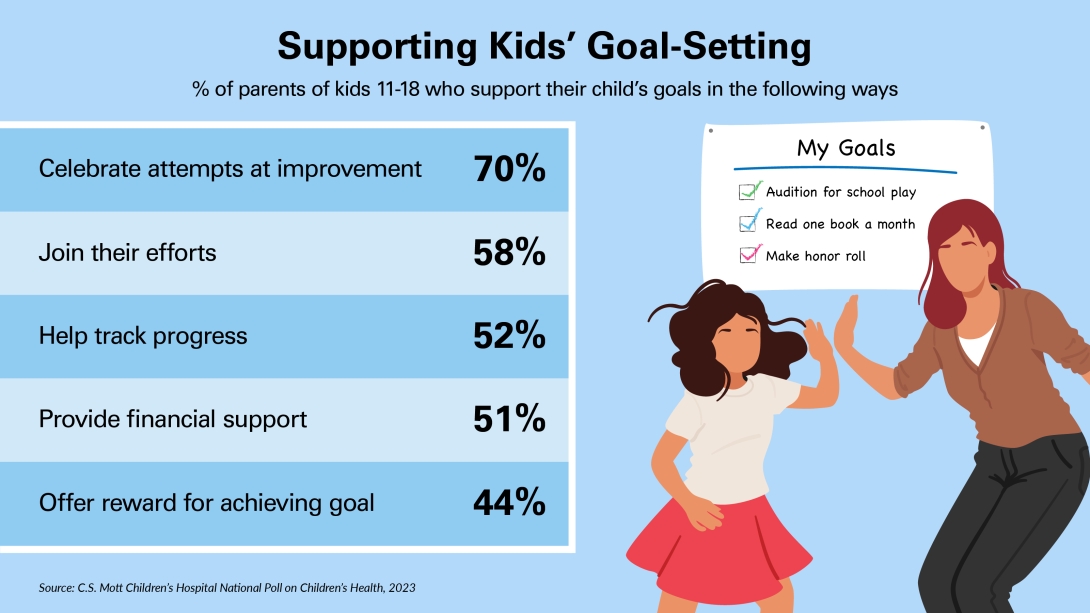6 ways families can make resolutions stick
3:10 PM
Author |

Among many parents’ top resolutions for the New Year: More patience, less time on phones, better consistency with discipline and healthier family habits.
Their tweens and teens are setting goals too – including achievements related to grades and school, success in an activity, exercise and nutrition and earning money, according to the University of Michigan Health C.S. Mott Children’s Hospital National Poll on Children’s Health.
“Milestone occasions, such as the start of a new calendar or school year, present families with opportunities for self reflection and motivation to improve an area of physical and emotional health,” said Mott Poll co-director Sarah Clark, M.P.H.
“Our poll suggests that parents often focus on areas they’d like to improve in their parenting approach, including being more engaged, focusing on their own and their child’s health, and supporting their child’s connection to the broader community.”
Nearly three in four parents report making resolutions or setting personal goals throughout the year, with a quarter of them hitting the reset button as the clock strikes midnight for the New Year.
Roughly half of mothers and a third of fathers say they have made goals to change something about their parenting: more than three quarters strive to be more patient and more than half want to spend less time on their phone.
Some parents have health related ambitions, too, with nearly half vowing to provide healthier meals and snacks and more than a third planning to exercise with their child.
Among those who have set parenting goals, roughly three quarters feel it has helped make them a better parent and even more believe that it has helped their child learn how to work toward a goal.
“Setting goals to improve parenting can help parents define their values and priorities and have positive effects on the health and well being of the whole family,” Clark said.
Parents with three or more children in the household are also more likely to set goals about being consistent with discipline and involving their children in spiritual activities, compared to parents with fewer children, the poll suggests.
“Taking steps to encourage goal setting is a great way for parents to show their support and confidence in their child.” Sarah Clark, M.P.H.
Kids have resolutions too
Over half of parents say that their child ages 11-18 years has set personal goals as well, according to the nationally representative poll based on 2,044 responses from parents of children ages 0-18 surveyed in August 2023.
When it comes to children’s goals, they’re primarily related to grades and school performance and a little more half of kids want to succeed at an activity. Others focus on exercise, eating habits and nutrition and earning money and more than a third would like to try something new.
According to parents, teens ages 15-18 more often cite goals related to nutrition and exercise and exploring something new is more common among children 11-14 years.
“Goal setting helps kids learn to be accountable for their actions and develop a growth mindset,” Clark said. “Parents modeling goal setting can also teach kids the importance of working toward something and learning from mistakes along the way.”
Parents polled shared different ways they support their kids in their goals. Most say
they celebrate their child’s attempt at improving while more than half join their child in working toward the goal.
Others help track their kids’ progress, provide financial support or offer a reward for meeting their goal.
“Taking steps to encourage goal setting is a great way for parents to show their support and confidence in their child,” Clark said.
Parents may want to identify specific strategies to enhance their ability to achieve their goal, she recommends.
“We all know how commonly people set New Year resolutions that fade as the year goes on,” Clark said. “If families are serious about sticking to resolutions, it’s essential to set specific and realistic targets and schedule time to take necessary steps to reach them.”

Among her top tips:
1. Take baby steps toward practical age appropriate goals
Clark says it’s tempting to identify broad goals but the more measurable and feasible the targets, the more likely they will stick.
For example, “volunteering at school once a month” provides a clearer path than “becoming more involved.” Parents can encourage the same for their children, helping them move from a general idea like “exercise more” to a specific target of biking or shooting hoops three times a week.
“Parents can engage children in setting resolutions and promote specific strategies to enhance their chance of achieving those goals,” Clark says.
Goals should align with age and development as well. For younger children, short term goals may work best. Older children who wish to try a new activity may benefit from talking with parents about the schedule, cost, and level of commitment required for potential activities to minimize conflicts with a family’s schedule and resources.
2. Ease the pressure on achievement
Some children may set a goal related to achieving something not completely within their control, such as earning a certain grade or test score or being selected for a sports team or role.
“It’s exciting for both parents and children when they succeed with this type of goal, and heartbreaking when a child’s best effort falls short,” Clark said.
“It’s important for parents to help their child find the learning experience in the situation by talking about what strategies were most effective and emphasizing the child’s growth and improvement.”
“A key strategy for parents is to link celebrations and rewards to the child’s effort – whether or not they fully achieve their goal.”
3. Don’t take over
Parents should be mindful of the line between offering support and taking over the scheduling and tracking of their child’s goals.
“An overly enthusiastic parent may undercut their child’s opportunity to learn from goal setting. Having the child own the responsibility and effort is more important than meeting the goal,” Clark said.
Parents might ask general questions about the child’s goal related activities, as a way to encourage conversation about the positive and negative aspects, as well as helping the child brainstormabout how to overcome any challenges. Keeping the focus on the child should help parents avoid doing too much.
4. Make health habits a family affair
When it comes to health goals, parents can enlist their children for help in sticking to resolutions.
For example, school age children can identify healthy snacks as parents are making the grocery list and older kids can help with healthy, family friendly recipes. Getting kids’ buy in on ways to exercise together, such as brisk family walks or family dance parties, can also put everyone on the same page.
5. Plan for quality time, limit distractions
Establishing a family schedule that carves out time for both work and unplugged, quality time together is beneficial.
Parents can designate screen free times and spaces, such as during meals, playtime or at bedtime. Apps and alerts can also help schedule these breaks throughout the day.
“Using technology more mindfully and increasing engagement with kids requires conscious effort and planning,” Clark said.
6. Use tools to shift parenting approaches
Some parenting goals may require more reflection, such as being more consistent with discipline and having more patience.
One useful strategy parents may consider for these areas is journaling, Clark says. Parents start out by recording what is most important and valued, and then explore how well their current approach fits with those values.
“This type of reflection may reveal differences between what parents value and what they actually do, providing motivation to make improvements,” she said.

Explore a variety of health care news & stories by visiting the Health Lab home page for more articles.

Department of Communication at Michigan Medicine
Want top health & research news weekly? Sign up for Health Lab’s newsletters today!





